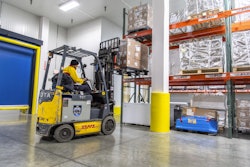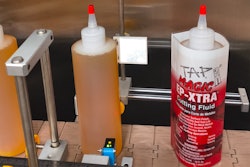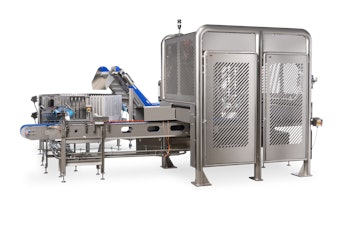
Digitization is the process of converting information from a physical format to a digital one, such as taking a proof of delivery, scanning and saving it on a computer. Taking that file and uploading it to the internet, so that everyone in the company can have access to it, is called digitalization. And the result of these type of actions is the process of digital transformation, explained Amy Shortman, Director of Product Marketing at Overhaul.
When looking at various trends that will be happening in the industry over the next ten years, Shortman said, “Digitization trends, which are operational today, are reshaping how we manage risk in the supply chain.” Some of the conference highlights included utilizing predictive analytics in the supply chain to prevent loss due to extreme weather events; real-time monitoring in pharmaceutical logistics to enable on-demand reaction to transport events and to increase forecasting accuracy; and, using virtual cold chain technology to bring end-to-end process visibility through simulation, and optimize parameters such as lane risk.
According to a 2018 Deloitte digital supply networks study, 90% of shippers are embracing the digital supply chain. 33% are prioritizing it among strategic objectives, while 32% are planning to start implementing in the next 12 months. 28% are currently implementing digital transformation initiatives.
Shortman painted two pictures of our future technological society – one dystopian, one utopian, and said that “One of the differences that we can see between utopia and dystopia is how artificial intelligence can be used to divide or connect people. Social media can be used as a weapon, or to connect people, and blockchain and AI make the utopian version very possible.” She also said, “I can see there is a beautiful fusion between the future, being technology driven but also utilizing the soft skills that humans have as well.”
Shortman went on to say “We’re finding at the moment within the industry that many companies are focusing on their digital journey. We know that shippers are utilizing this, and they’re building up teams of experts within their own organizations who are looking at how to utilize data and how to improve their supply chains through using technology.”
“We know the digitization trends are going to change,” said Shortman, “They're going to shape the way we're looking at risk within our supply chain. We know that each trend has a really important part in terms of becoming an enabler within our digital ecosystem and making sure that we are working with systems that are connected, intelligent, collaborative and trusted as well.”
Furthermore, said Shortman, “Companies who are developing strategies and are using digitalization to manage their supply chains, using transparency, visibility, situational risk management and incorporating those things like real-time data, will reduce the risk within their supply chain. Which is what we are trying to do, whether that's risk of theft or risk of temperature. The ultimate goal is that we deliver the products both safe and effective.”
Shortman also shared this quote: “Wherever you think you are in your digitization journey, you are already behind, because the space is developing faster than people can conceptualize.”
- According to a study by Price Waterhouse Cooper, the loss of jobs to automation and AI in the U.S. is estimated at 38% by 2030. 30% in the UK, and in Germany 35%. The jobs most likely to be taken over by robots are: 56% transportation and storage; 46% manufacturing and 44% retail.
“We're already seeing automation within warehouses and companies needing less staff to do jobs than they previously did," Shortman said, “The theory behind job dismantlement and artificial intelligence or automation coming in is that we will have more time as humans to concentrate on other things. There will be job losses but there also may be benefits in terms of the relationships we have with our clients and how we are working with them.” She asks, “how will your job change? What skills will the workforce need? How will technology benefit us and our industry? What impact will technology have on our industry? The challenge is to select partners and technologies that will allow future improvements.”
Shortman sees a (utopian) future in 2030 where companies will select their workers according to their talent for performing a specific task, and employees will be selected globally, and work together globally in teams. Avatars will be used in the hiring process, eliminating sex or race from consideration. Soft skills will become crucial to differentiating oneself and developing a strong personal brand while capitalizing on human-machine relationships will guarantee success. Also, “in-the-moment” learning will be commonplace, increasing the capacity to acquire new knowledge through virtual and augmented reality.
To learn more about the Cold Chain Council click here.
Digitization is the process of converting information from a physical format to a digital one, such as taking a proof of delivery, scanning and saving it on a computer. Taking that file and uploading it to the internet, so that everyone in the company can have access to it, is called digitalization. And the result of these type of actions is the process of digital transformation, explained Amy Shortman, Director of Product Marketing at Overhaul.
When looking at various trends that will be happening in the industry over the next ten years, Shortman said, “Digitization trends, which are operational today, are reshaping how we manage risk in the supply chain.” Some of the conference highlights included utilizing predictive analytics in the supply chain to prevent loss due to extreme weather events; real-time monitoring in pharmaceutical logistics to enable on-demand reaction to transport events and to increase forecasting accuracy; and, using virtual cold chain technology to bring end-to-end process visibility through simulation, and optimize parameters such as lane risk.
According to a 2018 Deloitte digital supply networks study, 90% of shippers are embracing the digital supply chain. 33% are prioritizing it among strategic objectives, while 32% are planning to start implementing in the next 12 months. 28% are currently implementing digital transformation initiatives.
Shortman painted two pictures of our future technological society – one dystopian, one utopian, and said that “One of the differences that we can see between utopia and dystopia is how artificial intelligence can be used to divide or connect people. Social media can be used as a weapon, or to connect people, and blockchain and AI make the utopian version very possible.” She also said, “I can see there is a beautiful fusion between the future, being technology driven but also utilizing the soft skills that humans have as well.”
Shortman went on to say “We’re finding at the moment within the industry that many companies are focusing on their digital journey. We know that shippers are utilizing this, and they’re building up teams of experts within their own organizations who are looking at how to utilize data and how to improve their supply chains through using technology.”
“We know the digitization trends are going to change,” said Shortman, “They're going to shape the way we're looking at risk within our supply chain. We know that each trend has a really important part in terms of becoming an enabler within our digital ecosystem and making sure that we are working with systems that are connected, intelligent, collaborative and trusted as well.”
Furthermore, said Shortman, “Companies who are developing strategies and are using digitalization to manage their supply chains, using transparency, visibility, situational risk management and incorporating those things like real-time data, will reduce the risk within their supply chain. Which is what we are trying to do, whether that's risk of theft or risk of temperature. The ultimate goal is that we deliver the products both safe and effective.”
Shortman also shared this quote: “Wherever you think you are in your digitization journey, you are already behind, because the space is developing faster than people can conceptualize.”
- According to a study by Price Waterhouse Cooper, the loss of jobs to automation and AI in the U.S. is estimated at 38% by 2030. 30% in the UK, and in Germany 35%. The jobs most likely to be taken over by robots are: 56% transportation and storage; 46% manufacturing and 44% retail.
“We're already seeing automation within warehouses and companies needing less staff to do jobs than they previously did," Shortman said, “The theory behind job dismantlement and artificial intelligence or automation coming in is that we will have more time as humans to concentrate on other things. There will be job losses but there also may be benefits in terms of the relationships we have with our clients and how we are working with them.” She asks, “how will your job change? What skills will the workforce need? How will technology benefit us and our industry? What impact will technology have on our industry? The challenge is to select partners and technologies that will allow future improvements.”
Shortman sees a (utopian) future in 2030 where companies will select their workers according to their talent for performing a specific task, and employees will be selected globally, and work together globally in teams. Avatars will be used in the hiring process, eliminating sex or race from consideration. Soft skills will become crucial to differentiating oneself and developing a strong personal brand while capitalizing on human-machine relationships will guarantee success. Also, “in-the-moment” learning will be commonplace, increasing the capacity to acquire new knowledge through virtual and augmented reality.
To learn more about the Cold Chain Council click here.
Digitization is the process of converting information from a physical format to a digital one, such as taking a proof of delivery, scanning and saving it on a computer. Taking that file and uploading it to the internet, so that everyone in the company can have access to it, is called digitalization. And the result of these type of actions is the process of digital transformation, explained Amy Shortman, Director of Product Marketing at Overhaul.
When looking at various trends that will be happening in the industry over the next ten years, Shortman said, “Digitization trends, which are operational today, are reshaping how we manage risk in the supply chain.” Some of the conference highlights included utilizing predictive analytics in the supply chain to prevent loss due to extreme weather events; real-time monitoring in pharmaceutical logistics to enable on-demand reaction to transport events and to increase forecasting accuracy; and, using virtual cold chain technology to bring end-to-end process visibility through simulation, and optimize parameters such as lane risk.
According to a 2018 Deloitte digital supply networks study, 90% of shippers are embracing the digital supply chain. 33% are prioritizing it among strategic objectives, while 32% are planning to start implementing in the next 12 months. 28% are currently implementing digital transformation initiatives.
Shortman painted two pictures of our future technological society – one dystopian, one utopian, and said that “One of the differences that we can see between utopia and dystopia is how artificial intelligence can be used to divide or connect people. Social media can be used as a weapon, or to connect people, and blockchain and AI make the utopian version very possible.” She also said, “I can see there is a beautiful fusion between the future, being technology driven but also utilizing the soft skills that humans have as well.”
Shortman went on to say “We’re finding at the moment within the industry that many companies are focusing on their digital journey. We know that shippers are utilizing this, and they’re building up teams of experts within their own organizations who are looking at how to utilize data and how to improve their supply chains through using technology.”
“We know the digitization trends are going to change,” said Shortman, “They're going to shape the way we're looking at risk within our supply chain. We know that each trend has a really important part in terms of becoming an enabler within our digital ecosystem and making sure that we are working with systems that are connected, intelligent, collaborative and trusted as well.”
Furthermore, said Shortman, “Companies who are developing strategies and are using digitalization to manage their supply chains, using transparency, visibility, situational risk management and incorporating those things like real-time data, will reduce the risk within their supply chain. Which is what we are trying to do, whether that's risk of theft or risk of temperature. The ultimate goal is that we deliver the products both safe and effective.”
Shortman also shared this quote: “Wherever you think you are in your digitization journey, you are already behind, because the space is developing faster than people can conceptualize.”
- According to a study by Price Waterhouse Cooper, the loss of jobs to automation and AI in the U.S. is estimated at 38% by 2030. 30% in the UK, and in Germany 35%. The jobs most likely to be taken over by robots are: 56% transportation and storage; 46% manufacturing and 44% retail.
“We're already seeing automation within warehouses and companies needing less staff to do jobs than they previously did," Shortman said, “The theory behind job dismantlement and artificial intelligence or automation coming in is that we will have more time as humans to concentrate on other things. There will be job losses but there also may be benefits in terms of the relationships we have with our clients and how we are working with them.” She asks, “how will your job change? What skills will the workforce need? How will technology benefit us and our industry? What impact will technology have on our industry? The challenge is to select partners and technologies that will allow future improvements.”
Shortman sees a (utopian) future in 2030 where companies will select their workers according to their talent for performing a specific task, and employees will be selected globally, and work together globally in teams. Avatars will be used in the hiring process, eliminating sex or race from consideration. Soft skills will become crucial to differentiating oneself and developing a strong personal brand while capitalizing on human-machine relationships will guarantee success. Also, “in-the-moment” learning will be commonplace, increasing the capacity to acquire new knowledge through virtual and augmented reality.
To learn more about the Cold Chain Council click here.


























